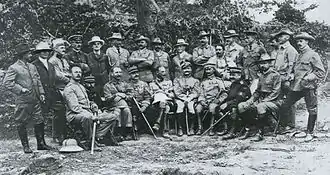William Maxwell (journalist)
Sir William Maxwell KBE (1860 – 23 December 1928) was a British journalist, soldier, writer and civil servant.[1][2]
Early life
Maxwell was born in 1860 [lower-alpha 1] in Workington, Cumberland of Irish-born parents William and Mary Maxwell, his father was an Insurance Agent. Maxwell was described in 1881 as a "Reporter on Newspaper".
War correspondent

Maxwell was a war correspondent for the London Standard, covering the Anglo-Egyptian victory at Battle of Omdurman (1898).
He forwarded reports to London from South Africa throughout the Second Boer War (1899–1902). He survived enteric fever and reported the Siege of Ladysmith. He followed Lord Roberts' campaign from the capture of Bloemfontein through battles at Lydenberg and the Komatipoort.[1]
In 1905, he resigned from the Standard, becoming a foreign correspondent for the London Daily Mail during the Russo-Japanese War (1904–1905).[3]
Prior to the outbreak of the Great War in Europe, he covered the Balkan War (1912).[4]
During the First World War, he reported the First Battle of the Marne (September 1914) for the London Daily Telegraph. Shortly afterwards, he enlisted with the rank of captain and assignment to the general staff.[1]
Military Censor
As the Chief Field Censor on the staff of General Sir Ian Hamilton in the Gallipoli campaign (April–December 1915), Captain Maxwell played a central and crucial role in the unsuccessful attempt to mitigate reports about events unfolding in the Dardanelles and on the Turkish coast in 1915.[5]
Press correspondents at Gallipoli were required to submit all their writing to Captain William Maxwell, whose approval was necessary under regulations drawn up by and enforced by the British Army. Although many later questioned the level of censorship at Gallipoli, most accepted the censorship as an essential element of wartime reporting. Gallipoli's geographic isolation made Maxwell's task was made easier by the isolation of the area that he oversaw. The Gallipoli campaign was fought on the edge of a virtually uninhabited mountain range. The only way to cable messages from Gallipoli was through the official channels.[6]
Later life
After the war Maxwell became a section chief in the Secret Service. Maxwell never married and he died at "Longfield" his home in Wraysbury on 23 December 1928, aged 66.[2] William Maxwell married Clara Hardy, daughter of Adam Hall Hardy, of Buttershaw, Bradford, on 15 June 1886, at St Pauls Church, Buttershaw
Selected works
- 1902 — With the "Ophir" round the empire : an account of the tour of the Prince and Princess of Wales[7]
- 1906 — From Yalu to Port Arthur. London: Hutchinson & Co. OCLC 2010584
- 1921 – What's wrong with your work?
Honours and awards
- 1906 — Order of the Rising Sun, Japan.[1]
- 1919 – Knight Commander of the Order of the British Empire[1]
Notes
- The 1861 Census on 7 April 1861 lists him as four months old, his birth was registered in Cockermouth in the fourth quarter of 1860
Notes
- Roth, Mitchel P. and James Stuart Olson. (1997). Historical Dictionary of War Journalism, p. 196.
- "Sir William Maxwell – Correspondent in Many Wars". The Times. The Times Digital Archive. 27 December 1928. p. 17.
- Roth, p. 267.
- "Slavs Menace Dual Monarchy; Raising of Prince of Montenegro to Rank of King Is Regarded as Ominous," New York Times. 28 August 1910; Roth, p. 196.
- Knightly, Philip. "Beating the censor – Ashmead-Bartlett's efforts to reveal the real story of Gallipoli," Visit Gallipoli (Information Services Branch of the Board of Studies NSW for the Department of Veterans' Affairs); Knightly, Phillip (2004). The First Casualty, p. 107.
- National Library of Australia: "Despatches from Gallipoli, Censorship.
- "Review of With the 'Ophir' round the Empire by William Maxwell ..." The Quarterly Journal. 196: 1–19. July 1902.
References
- Knightly, Phillip. (1975). The First Casualty – From Crimea to Vietnam: The War Correspondent as Hero, Propagandist, and Myth Maker. New York: Harcourt Brace Jovanovich. ISBN 978-0-15-131264-1 (cloth); ISBN 978-0-15-631130-4 (paper) [re-issued by Johns Hopkins University Press, 2004: ISBN 978-0-8018-8030-8 (paper) OCLC 55138599
- Roth, Mitchel P. and James Stuart Olson. (1997). Historical Dictionary of War Journalism. Westport, Connecticut: Greenwood Publishing Group. ISBN 978-0-313-29171-5